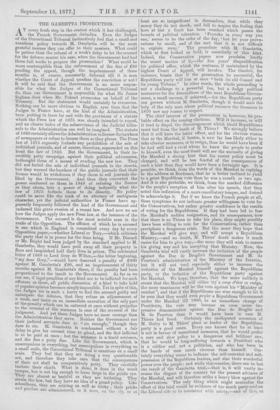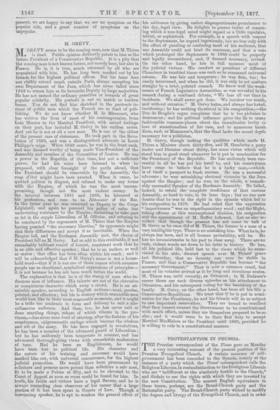THE GAMBETTA PROSECUTION.
AT every fresh step in the contest which it has challenged, the French Government dwindles. Even the Judges of the Correctional Tribunal instinctively feel that a small and vexatious policy towards M. Gambetta will be the most grateful incense they can offer to their masters. What could be pettier than the refusal of a week's delay to let the counsel for the defence master his case, when the Government had had three full weeks to prepare the prosecution ? What could be more contemptible than the enforcement of the fine of £80 pending the appeal, though the imprisonment of three months is, of course, necessarily deferred till it is seen whether the Court of Appeal quashes the conviction or not ? It will be said that the Government is no more respon- sible for what the Judges of the Correctional Tribunal do, than our Government is responsible for what Sir James Ingham does when Mr. Poland prosecutes on behalf of the Treasury. But the statement would certainly be erroneous. Nothing can be more obvious to English eyes than that the Judges in France have, at the hint of the Administration, been putting in force far and wide the provisions of a statute which the Press law of 1875 was clearly intended to repeal, and no clearer index of the subservience of the Judicial tribu- nals to the Administration can well be imagined. The statute of 1849 certainly allows the Administration to license the hawkers of newspapers or refuse to license them as they please. The Press law of 1875 expressly forbade any prohibition of the sale of individual journals, and of course, therefore, superseded on this head the law of 1849. But the Government, in their in- credibly petty campaign against their political adversaries, bethought them of a means of evading the new law. They did not forbid the sale of individual journals in the streets, but they warned the hawkers of the public journals that their licence would be withdrawn if they chose to sell journals dis- liked by the Government. And thus they converted the power conferred on them in 1819 of refusing the licence as they chose, into a power of doing indirectly what the law of 1875 forbade them to do directly. No policy oould be more like the trick of an attorney of ambiguous character, yet the judicial authorities in France have ap- parently frequently followed the lead of the Government and endorsed this grave evasion of a recent law. And now we see how the Judges apply the new Press law, at the instance of the Government. The accused is the most notable man in the ranks of the Opposition. The offence of which he is accused is one which in England is committed every day by every Opposition paper,—whether Liberal or Tory,—which criticises the party that is in power for the time being. If Mr. Disraeli or Mr. Bright had been judged by the standard applied to M. Gambotta, they would have paid away all their property in fines and languished half their lives in prison. The celebrated letter of 1868 to Lord Grey de Wilton,—the letter beginning, "my dear Grey,"—would have deserved a penalty of £800 against M. Gambetta's £80, and an imprisonment of thirty months against M. Gambetta's three, if the penalty had been proportioned to the insult to the Government. As far as we an see, if legal penalties of any kind are to be inflicted for such offences as these, all public discussion of a kind to take hold of popular opinion becomes simplyimpossible. Yet in spite of this, the Judges are in such a hurry to find the accused guilty and anticipate the defence, that they refuse an adjournment of a week, and insist on an immediate execution of the only part of the penalty which can be enforced at once without prejudice to the reversal of the sentence in ease of the reversal of the judgment. And yet these Judges have no more courage than the Administration they serve. Neither the Government nor their judicial servants dare to "sin strongly," though they dare to sin. M. Garabetta is condemned without a fair delay to give his couuael time to plead, and the find inflicted is to be paid at once ; but the sentence is a timid sentence, and the fine a petty fine. Like the Government, which is unscrupulous in everything, but unscrupulous in everything on a small scale, the Correctional Tribunal is vexatious on a small scale. They feel that they are doing a very questionable act, and therefore they take care that the consequences of their act shall be comparatively petty. They carefully imitate their chiefs. What is done, is done in the worst temper, but is not big enough to loom large in the public eye. They are almost as bashful as they are irritating. They strain the law, but they have no idea of a grand policy. Like schoolboys, they are retiring as well as tricky ; their pricks and pinches are administered, as it were, on the sly, or at least are so insignificant in themselves, that while they annoy they do not shock, and fail to inspire the feeling that here at last a limit has been reached which passes the bounds of political toleration. 'Provoke in every way you can,' seems to be the order of the day, 'but let your provo- cations be small, and of the sort that it is not difficult to explain away.' The procedure with M. Gambetta, which at first looked so bold, is essentially of this kind. Indeed, the Conservative papers now proclaim loudly the secret motive of it,—the five years' disqualification for political office, which the sentence, if maintained by the highest Court of Appeal, will involve. The Gaulois, for instance, boasts that if the prosecution be successful, the Republican party will lose at once "both its old Consul and its young Tribune." In other words, the whole proceeding is not a challenge to a powerful foe, but a dodgy political manceuvre for the discomfiture of the next Republican Govern- ment, a small success, if achieved,—for the Republican party can govern without M. Gambetta, though it would miss the help of the only man whose political resource the Germans in 1870 saw any reason to respect. The chief interest of the prosecution is, however, its pro- bable effect on the coming elections. Will it increase, or will it tend to dispel, the discouragement which timid Republicans must feel from the death of M. Thiers ? We strongly believe that it will have the latter effect, and for the obvious reason that as the Marshal, if beaten, is now far less likely either to take ulterior measures, or to resign, than he would have been if he had still had a rival whom he knew the people to prefer to himself, even the most timid will see the necessity of giving the Marshal a strong hint that hie recent policy must be changed, and will be less fearful of the consequences of such a hint than they would have been a fortnight ago. It is possible, we think, from the words of the Marshal in replying to the address at Bordeaux, that he is better inclined to yield to a great Republican vote than he was a month or two ago. And it is also probable, we think, from the marked difference in the people's reception of him after his speech, that they noted this indication of a more conciliatory temper, and desired to acknowledge it. But if we know the French people at all, these symptoms do not indicate greater willingness to vote for the Conservatives, but rather greater confidence in the results of voting for the Republicans. If they had been led to fear the Marshal's sudden resignation, and its consequences, now that there is no Thiers to take his place, they might possibly have been willing to vote for the Conservatives, rather than precipitate a dangerous crisis. But the more they hope that the Marshal will give way, and will accept a Republican Ministry,—and no doubt, M. Thiers' death makes it much easier for him to give way,—the more they will wish to ensure his giving way and his accepting that Ministry. Now, the Gambetta trial will vastly increase the irritation of the people against the Due de Broghe's Government and M. de Fourtou's administration of the Ministry of the Interior, but it will not tend especially either to increase the irritation of the Marshal himself against the Republican party, or the irritation of the Republican party against the Marshal. We hope, therefore, that the more unlikely it seems that the Marshal will either try a coup d'crtat or resign, the more unanimous will be the vote against his "Ministry of combat"; and that if the Republicans are wise enough to let it be seen that they would even prefer a Republican Government under the Marshal till 1880, to an immediate change of Presidents, the vote may become an even more im- pressive demonstration against the Duo de Broglie and i M. de Fourtou than t would have been in case M. Thiers had lived. Certainly the undisputed accession of M. Grdvy to M. Thiers' place as leader of the Republican party is a good omen. Every one knows that he at least is not in favour of sensational measures, that he would prefer a sure and slow policy to adangerous and brilliant one, that he would be long-suffering towards a President who is a soldier and not a politician, and , who has been in the hands of men much cleverer than himself. Cer- tainly everything seems to indicate the self-restraint and self- possession of the Republican leaders, and also their wonderful power over the people; and while this remains, there can be but one result of the Gambetta trial,—that is, it will vastly in- crease the disgust of the country for the present advisers of the Marshal, and will therefore strike a heavy blow against the Conservatives. The only thing which might neutralise the effect of this trial would be evidence of too much party-zeal on the Liberal side to be consistent with salety,—and of this, at present, we are happy to say that we see no symptom on the popular side, and a great number of symptoms on the unpopular.































 Previous page
Previous page